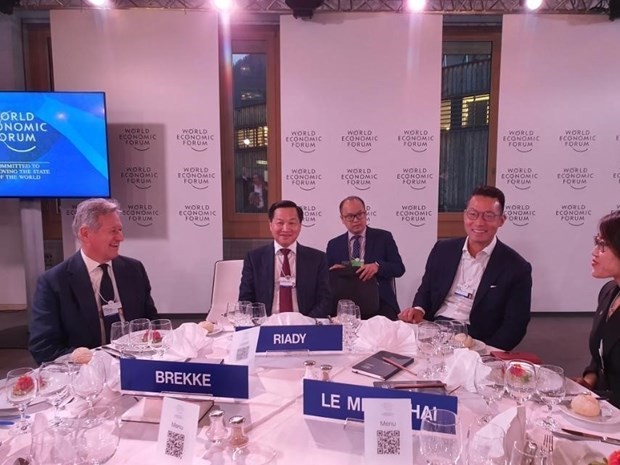(VOVWORLD) - Deputy Prime Minister Le Minh Khai over the past two days joined various activities within the framework of the 52nd World Economic Forum (WEF) annual meeting in Davos, Switzerland.
 Deputy Prime Minister Le Minh Khai (second from left) addresses the ‘A Digital ASEAN for All’ sessions. (Photo: VNA) Deputy Prime Minister Le Minh Khai (second from left) addresses the ‘A Digital ASEAN for All’ sessions. (Photo: VNA) |
At the ‘A Digital ASEAN for All’ sessions and dialogue between leaders regarding the building of self-reliant economies for sustainable development under the chair of WEF President Borge Brende, Khai shared Vietnam’s viewpoints and development orientations, including sustainable development on the foundation of science-technology, innovation and digital transformation.
Vietnam welcomes and stands ready to create optimal conditions for foreign organisations and firms to join hands with the Vietnamese Government and businesses to promote digital economic development through human resources training, technology transfer, research-development and innovation.
He underlined that digital transformation in combination with sustainable development must be carried out concertedly at three levels.
International cooperation must be bolstered at the global level so as to support developing nations to narrow the digital gap and ensure that no one is left behind. Global and multilateral mechanisms and frameworks are needed to manage emerging issues related to the digital economy.
A digital ecosystem must be built at the national level, including digital institutions, infrastructure, management, and personnel. The public-private partnership needs to be strengthened to maximise stakeholders’ engagement.
Businesses have to take advantage of digital technology and data so as to improve productivity and competitiveness, use energy efficiently, and develop green products, thereby creating momentum for sustainable development.
Deputy PM Khai had a meeting with Lithuanian President Gitanas Nauseda, during which the two sides affirmed that they treasure the traditional friendship between Vietnam and Lithuania. As the two countries celebrate the 30th anniversary of their diplomatic relationship this year, Khai suggested that the two sides make best use of bilateral cooperative mechanisms and coordinate to hold trade promotion events to bolster their economic ties.
He thanked Lithuania for its active support of the signing of the Vietnam-EU Free Trade Agreement (EVFTA) and for being among one of the first countries to ratify the EU-Vietnam Investment Protection Agreement (EVIPA). He also appreciated the mutual support of the two countries for each other’s candidacy to UN agencies and organisations.
President Nauseda asked Vietnam to facilitate Lithuanian enterprises’ access to the Vietnamese market, and through it to the Southeast Asian region.
Deputy PM Khai took the occasion to convey an invitation to visit Vietnam from President Nguyen Xuan Phuc to the Lithuanian President.
Meeting with Federal Councillor Guy Parmelin, the head of the Federal Department of Economic Affairs, Education and Research (EAER) of Switzerland, Deputy PM Khai suggested that the two countries intensify measures to restore their economic ties, especially in fields where Switzerland has strength and Vietnam has demand, such as finance-banking, insurance, manufacturing, pharmaceuticals, farm produce processing and tourism.
Khai thanked Switzerland for providing ODA for Vietnam and asked the Swiss government to continue creating favourable conditions for the Vietnamese community in the country to settle down and integrate into the host society, thus playing a bridging role in the relations between the two countries.
Parmelin said he hopes the two countries will continue to push ahead with negotiations on a free trade agreement between the EFTA and Vietnam. He affirmed that Switzerland will soon hold discussion with Vietnam for the early conclusion of the FTA , thus promoting sustainable development of bilateral trade ties.
In another meeting, Deputy PM Khai and Peruvian Foreign Minister César Rogrigo Landa noted their joy at the development of bilateral ties between the two countries, particularly in economics-trade-investment. They noted that Vietnam’s Bitel project in Peru and Peru’s investment projects in beverage and tourism in Vietnam are operating effectively.
The two sides agreed to promote the exchange of delegations at all levels, and work to perfect the legal framework to facilitate stable and sustainable development of bilateral ties.
While receiving OECD Secretary-General Mathias Cormann, the Vietnamese Deputy PM proposed that OECD continue assisting Vietnam in implementing its programme for socio-economic recovery, especially in areas where OECD has strength such as economic restructuring, growth model renewal, innovation, stock market management, State-owned enterprise governance and anti-corruption.
Cormann said Vietnam is among a few countries with good recovery after the COVID-19 pandemic, and affirmed that the country is among the most important partners of the OECD in Southeast Asia. He pledged that the organization will work closely with Vietnam to help the country realise its development goals.
Khai invited the OECD Secretary-General to visit Vietnam and attend a regional economic forum that Vietnam will host in the framework of the Southeast Asia Programme in September this year.
At another meeting with Minister-President of Flanders Jan Jambon, Deputy PM Khai noted the development trend of Vietnam-Belgium ties, and that Flanders is an important development partner of the Mekong River Commission.
The Vietnamese Government official expressed his hope that the two sides will continue to join hands for the early approval of the EVIPA by Belgian agencies. He urged Belgium and the EU to promote investment in the Mekong River region and the Mekong Delta in such fields as smart agriculture, climate change adaptive irrigation, green infrastructure and human resources training.
The Minister-President of Flanders pledged to work for the early ratification of the EVIPA and promote the region’s cooperation with Vietnam in fields of the region’s strength, for example agriculture, maritime trade, education, science-technology, water resources management, and climate change adaptation.